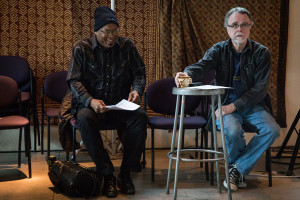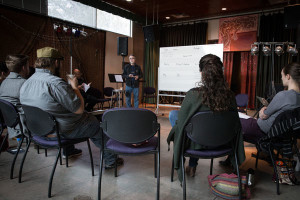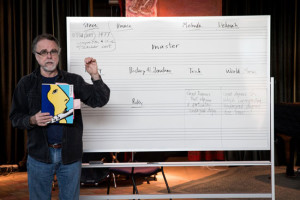Tags
Related Posts
Share This
Music Futures

Department Chair Horace Alexander Young interjects the collegiate focus at the roundtable discussion with some good laughs. Photo by Jessie Leigh
On Feb. 21 in O’Shaugnessy Performance Space, Contemporary Music Program Chairman Horace Young, faculty members Steve Paxton, Melinda Russial and Deborah Ungar, along with Career Services Director Joanie Spain discussed career choices and master’s degrees in music entertainment and education. The weekend workshop was more of a roundtable with questions and answers on qualification, making the right choices and the availability of options. Music department faculty and advisors exchanged information and anecdotes about their own graduate school experiences.
On the types of degrees:
“The standard type of master degree in music is master of music education. There are also a lot of schools that offer a degree in musical arts,” said former CMP Chairman Steve Paxton. “We at SFUAD offer a bachelor’s degree.”
Paxton advised looking into the different kinds of degrees in order to choose one that will allow for more flexibility or will encompass all the areas of study and work in that field.
“A master’s degree in Music is mostly a specific directed study, a Master of the Arts has more flexibility; a Master of Fine Arts is typically associated with subject matter outside traditional performance music and music history,” he said.
As for selecting a university, college, or conservatory for pursuing a master’s, Paxton and Joanie Spain suggested intensive research into the classes offered as well as the prerequisites for the degree.
“There are dozens of different kinds of degree. And you can’t tell what the essential components of the degree just from its name,” Paxton explained. “An MFA is a very common degree in creative writing and theatre, not so much in music. Colleges are always adding new degrees. There are so many choices.”
Sometimes full-time enrollment is not an option. Young suggested looking into alternatives such as part-time enrollment or combining degrees by taking specific classes and exams.
“There are online master’s programs that are becoming much more legitimate. There are lots of schools that combine a master’s and a doctoral degree,” said Young.
There also are ways to speed up the amount of time needed to get a graduate degree. Deborah Ungar added that she “found a thesis, so that streamlined the GRE [Graduate Record Examination required for some graduate programs].”

Students and faculty from the music department gather at a roundtable event which addressed the realities of pursuing a Masters Degree. Photo by Jessie Leigh
On financial issues:
In order to cut down on costs, Melinda Russial suggested taking specific exams.
“I did not take the GRE. I didn’t need to. However I didn’t know that GRE would have opened a lot of scholarship opportunities. If you test well, think about taking it.”
Russial also advised looking into the details and searching for more opportunities.
“There are things I should have done such as go for the smaller scholarships. Start asking questions now about the smaller scale things you can do to reduce your loans,” she said.
Many of the faculty members discussed becoming a teaching assistant. They also urged students to acknowledge the time and effort needed to run a class. Young mentioned creating commerce for the college by teaching a few classes in order to be more valuable as a student and thus attract more scholarships.
“I was very fortunate to have no student loan debt since I was a teaching assistant,” he said. “There is a pool of money for those early applicants and for those with a really high graduate GPA.”
Spain also brought up loan deferment.
“Grad school is one of the circumstances where your subsidized loans won’t acquire interest,” Spain said. “However your unsubsidized loans will.” Spain suggested looking into each individual financial situation since “there are circumstances in which the federal government would pay off your interest while you defer.” She also mentioned that many programs have graduate assistantships and fellowships that pay for course work. “Your loan payments don’t start up till six months after you graduate.”
Ungar added that there are job opportunities nearby in Santa Fe. “There are some middle schools and high schools near here where you can volunteer to teach and maybe even get paid,” Ungar said. “Graduate schools might waive out of school tuition for a year.”
On time and effort:
Getting a graduate degree in music requires a lot of practice and dedication. Young talked about his difficulties in catching up to the rest of the students.
“Because I thought I was behind in music, I took 18 to 20 credits. I averaged six hours a day practicing playing my instrument. The preparation for my degree was doing recitals.” Not everyone can manage it, Young explained. “Since I was taking summer classes and studying so much I burned out and took two years off, free-lanced. My time was spent figuring out a path and then following it.” Sometimes taking a step back and looking at the bigger picture is essential.
Ungar also mentioned dedication to mastering an instrument or a specific set of skills. “I spent a lot of time in my masters program practicing. You have to get through a lot of materials really quickly.”
Many of the faculty talked about their own struggles with putting in as much time as was required for the degree.
“Each semester I took one academic class and all the rest were clarinet classes,” Russial said. “I’ve had to develop ways to practice efficiently since I couldn’t spend as much time as everyone else.” The emphasis is placed on quality not quantity of practice and execution of music skills.
“If you go to graduate school you have to drink coffee,” Paxton joked.

Steve Paxton, faculty in the Contemporary Music Department, addresses the subject of obtaining a Masters Degree with students pursuing their degrees in the Musical Arts. Photo by Jessie LeighMusic
On making the right choice:
Paxton advocated for figuring out goals first.
“You get started on the search,” he said. “If you have your eyes set on a particular path you have to start setting yourself up for it.” Choosing the right institution has a lot to do with the environment surrounding it. “Don’t just go for prestige,” Paxton added. “There’s a lot of advantages to being in a smaller college. I personally prefer those.”
Young added that the political structure for every college is very different.
“You have to learn how to market yourself. It’s a pipeline that helps you get into different positions,” he said.
Ungar suggested finding a teacher you like and asking “what can I do to get in?”
Spain offered to help with essays and recommendations. She also recommended reaching out to alumni.
“There’s over 400 graduate programs related to music. In the three years, I’ve tracked alumni who went out to UCLA, Mills College, Arizona state. Ask them about the experiences and culture at the colleges you’re considering. Ask yourself, does it forward your possible goals. Is it necessary? The culture of the school is important to your future.”
But the entire group agreed that making mistakes and changing your mind is important. There is room for figuring out who exactly you want to be and what you want to do.
“Live with the decision for 48 hours. And see how you feel about it. Anxious? Energized? Are you breathing into a brown paper bag?” Ungar asked every individual in the room. “There’s a lot of pressure to get it right. But you should be able to make your own choices and change your mind. You’re not going to mess it up. Your path is going to bend and wind.”
The students present at the event responded well to the feedback. The questions asked afterward focused on personal career goals and how to combine different passions such as teaching and performing.
“I feel so lucky to have professors that not only want to help me get my bachelor’s degree but are truly invested in my future as well,” CMP major Elise Stoffer, who attended the roundtable, said. “I learned a lot of new information at this workshop. Knowing I have so many resources and incredible people to help me along the way is very reassuring.”
Saqeef Ali, another music major, added that much of the information provided at the event “was very much needed. It really gave insight on what I might be getting myself into and how I might be able to manage it financially.” He also mentioned that “hearing about the process and the experience of my mentors was excellent…[as was] hearing all of the different options offered and having their support in pursuing a master’s degree,” and thanked the workshop faculty for attending and sharing their experiences.
Overall, many students left the session a bit more enlightened about their career choices. Encouraged to pursue their passions beyond graduate school, a lot of the music majors felt a bit more prepared to take the next step in their education.
For more information, visit www.music.org, an association of conservatories, colleges, individual musicians, and scholars.






 Jackalope Magazine is the student magazine of Santa Fe University of Art and Design. Building on the interdisciplinary nature of our education, we aim to showcase the talent of our university and character of our city.
Jackalope Magazine is the student magazine of Santa Fe University of Art and Design. Building on the interdisciplinary nature of our education, we aim to showcase the talent of our university and character of our city.
Recent Comments